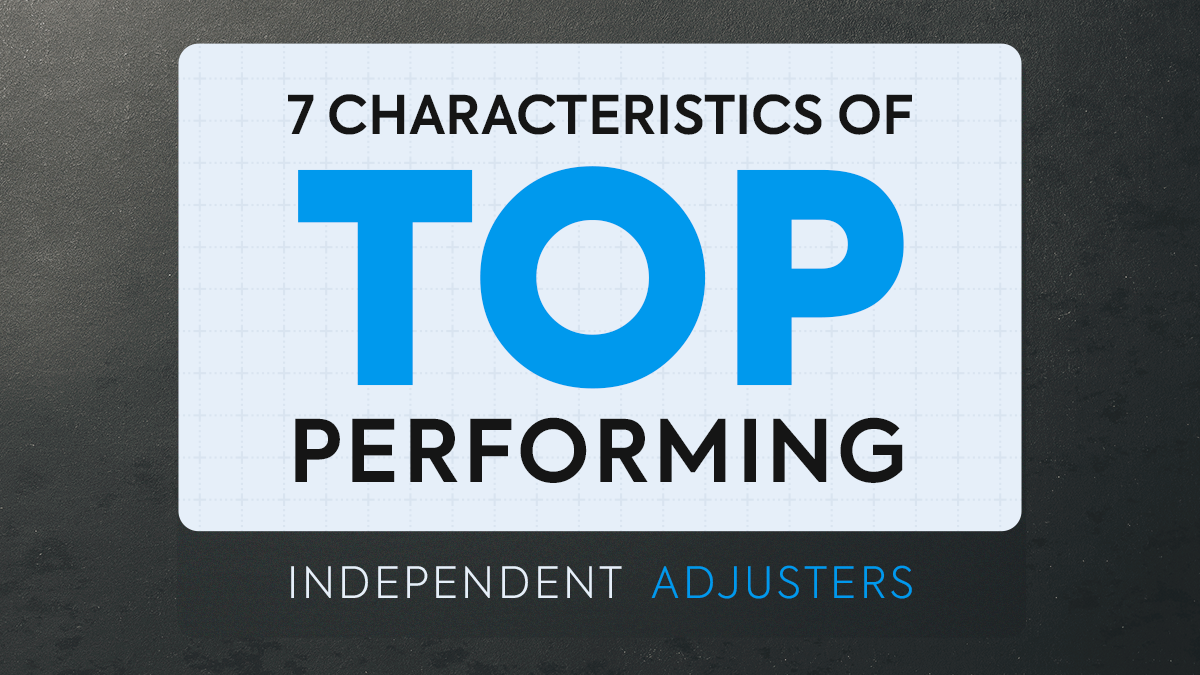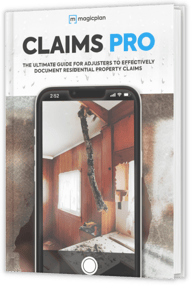Claims Adjuster
7 Characteristics of Top-Performing Independent Adjusters
 Do you have what it takes to be a successful independent adjuster? The benefits of working in this role include significant freedom, a sense of accomplishment, and high earning power. Yet not everyone is actually cut out to do it. So, let’s take a closer look at the traits of top adjusters. Read the list of ideal behavioral characteristics that we compiled below, and see how many match up with your own approach to working.
Do you have what it takes to be a successful independent adjuster? The benefits of working in this role include significant freedom, a sense of accomplishment, and high earning power. Yet not everyone is actually cut out to do it. So, let’s take a closer look at the traits of top adjusters. Read the list of ideal behavioral characteristics that we compiled below, and see how many match up with your own approach to working.
1. Integrity
The number one characteristic of a prosperous independent adjuster is integrity. The process of claims adjusting involves shouldering a high level of responsibility and making decisions with important consequences. This requires having an innate, deep-rooted sense of honesty, and always displaying honorable, ethical actions. Unfortunately, many adjusters must deal with temptations such as bribes, kickbacks, and other crooked activities. A good adjuster must always be vigilant against these types of enticements – and will gain a good reputation by doing so. But unethical adjusters are unwelcomed and not likely to last long in the industry.
2. Inquisitiveness
Another important characteristic to have is an inquisitive nature – one that that leads to exploring, learning and paying attention to details. The more inquisitive you are with investigations of insurance claims, the more comprehensive and accurate your reports are likely to be. That’s a good thing because well-done reports are highly valued by insurance companies, and can help prevent costly re-inspections of claim sites.
3. Resourcefulness
This means you’re always seeking out the best solutions for performing your job duties. Here are some examples:
- Learning about and using technology tools. Do you consider yourself to be a techie type of person? In order to make a living as an independent adjuster, you must be adept at incorporating technology into every work day. A mobile phone is mandatory, of course. Other beneficial tools include:
- a mobile tablet, if you like to work with a larger screen while in the field
- a floor plan app that improves your work process by letting you sketch and mark up room layouts in record time that can be sent to Xactimate® directly, and also submit detailed home-damage photo reports from the field (ideal if you specialize as a home insurance adjuster)
- a bluetooth laser distance meter for fast and super-accurate measuring
- a camera-mounted drone for easier, safer roof inspections
- Working on expanding your knowledge. You’ll want to continue your education and perhaps even acquire new certifications. These steps will help you expand and improve your professional capabilities as an independent adjuster.
- Networking with others in your industry. Interacting with other professionals in the insurance business can help you gain new insights about operating and marketing your business. It may even lead to meeting new contacts who can send claim assignments your way.
- Knowing how to deploy quickly. This is especially important when you’re given a tight deadline or you must respond quickly to catastrophe claims.
READ MORE: 5 Ways to Optimize Your Productivity as an Independent Claims Adjuster
4. Meticulousness
Do you have a keen eye for detail? Do you tend to be precise and thorough with your work? Are you careful with your decisions and actions? All of these attributes point to a meticulous personality, which is ideal for a career in claims adjusting.
5. Dependability
When you work for Independent Adjusting (IA) firms, you will need to demonstrate your dependability on a continual basis. The people who hire you need to be sure that they can rely on you. And they will expect you to manage and close every assigned claim in a professional, thorough and efficient manner. If you do that, you’re more likely to get hired again and again.
6. Confidence
Working independently requires handling a wide variety of tasks, developing your own unique workflows, navigating the claims process with no supervision, and making critical decisions about financial settlements. When you face all of these challenges on a regular basis, you must remain confident and self-assured about your own abilities. Having a positive mindset is a key to succeeding in this type of career.
7. Determination
Claims adjusting requires fortitude and persistence in the face of obstacles. You may have to deal with dangerous weather, travel complications, unresponsive claimants, language barriers and other problems. Nevertheless, having a can-do attitude, a will to succeed and an ability to adapt and overcome can help tremendously, to help you persevere during those times when your job isn’t easy.
But Wait – You’ll Need Some Essential Skills as Well
The seven characteristics listed above should be thought of as distinguishing qualities that can help you be successful as an independent adjuster. You may exhibit some or even all of those qualities. If so, that’s great. Yet it’s important to know that personal characteristics or qualities are quite different from job skills.
If you believe you have the right characteristics and the desire to be an independent adjuster, then you’ll also want to work on acquiring these seven important skills:
- Communication skills – being able to interact professionally and pleasantly with all types of people, while displaying patience, empathy and a cooperative attitude
- Investigative skills – knowing what questions to ask, and demonstrating expertise in systematically researching and exploring factual evidence
- Analytical skills – being able to analyze information and use logic in a careful manner to determine the proper outcome of each claim
- Math skills – having enough math aptitude to calculate property damage
- Software skills – knowing how to use relevant, independent adjuster software to close claims quickly
- Organizational skills – being able to maintain an uncluttered workspace and use organized systems for appointments, notes, documents, photos, floor plans, reports, etc.
- Time-management skills – knowing how to manage multiple claims simultaneously, prioritize tasks effectively, and complete tasks efficiently
Summary
In this article, we covered seven characteristics that make certain independent adjusters stand above the rest. We also identified what skills are needed to be a claims adjuster. If you can already check off a lot of these characteristics and skills, then you may be well suited to work in this type of role.
Demonstrate resourcefulness by using a floor plan app for home insurance claims
Or find out how to become an independent adjuster.
Related articles

Zuzanna Geib
Team Lead Marketing

